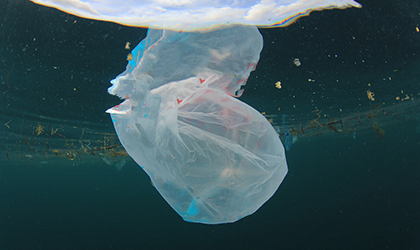
In recent years, countries have passed legislation to charge shoppers for each new plastic bag used to encourage them to re-use bags they already own. It’s one of many initiatives to reduce the large quantity of plastic waste that leaks into the natural environment, particularly the oceans, causing ecological damage (see our October 2017 issue for more on this story).
The plastic bag charge that was introduced in England in October 2015 has so far been hailed a success, despite some initial grumbles and reports of customers stealing shopping baskets.
Now, retailers with more than 250 employees are legally required to charge for plastic bags, monitor the number sold, and report the data to the government every year. Data released in July 2016 found that 1 billion plastic bags were sold by 286 retailers between October 2015 and April 2016. The most recent data release, for the year 2016/17, recorded sales of 2.1 billion single-use plastic bags.
There are no directly comparable figures pre-dating the introduction of the charge, but the recycling charity Wrap reported that 7.6 billion single-use carrier bags were given away in England in 2014, and that’s based on data from only seven large retailers (Asda, Co-operative Group, Marks & Spencer, Morrisons, Sainsbury’s, Tesco and Waitrose).
As this is a plastic bag charge, not a tax, proceeds do not go to the government. Instead, retailers are expected to donate their bag-related profits to worthy causes. Net proceeds (less value-added tax and other costs) of the plastic bag charge were £84 million for 2016/17, but only £66 million was donated. The full data set reveals who did and did not donate.
Other articles in this series
- Plastic in the ocean: How much is out there, and where does it go?
- A climate on the edge: Predicting environmental tipping points
About the author
Ronan McAdam is a PhD researcher in physical oceanography at the Department of Physics and the Grantham Institute of Climate Change and the Environment, Imperial College London.




